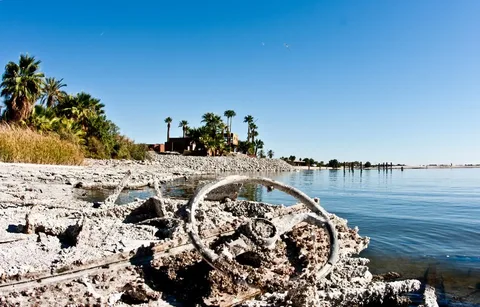LOS ANGELES Lisa Clark moved to the 500-person village of Niland five years ago from her hometown of El Centro in search of more inexpensive accommodation. However, being within two miles southeast of the Salton Sea now comes at a hidden cost.
“I’ve been experiencing severe asthma attacks recently,” the 56-year-old Oasis Mobile Village RV Park manager stated. She used to just require one inhaler a year, but since relocating to Niland, she has needed three. “It’s becoming worse, and my spouse has seen the same thing. It appears that our health is deteriorating.
The Salton Sea region is infamous for having poor air quality. The biggest lake in California has been getting saltier and dustier as it has emptied farther, making it difficult for residents like Clark to breathe. In addition to the health issues, she reports a persistent “putrid dead smell” coming from the water.
According to a University of California, Riverside research that will soon be published, the foul smells emanating from the Salton Sea have become an annual annoyance for people living in the cities surrounding the lake. For the past six days, the South Coast Air Quality Management District has been issuing odor advisories to areas of the Coachella Valley that are directly north of the Salton Sea.
Why is the scent of the California Salton Sea so strong?
According to Caroline Hung, a doctorate candidate and researcher at the Lyons Biogeochemistry Lab at UC Riverside, a number of causes have led to this lingering stench.
First off, according to Hung, the Salton Sea is heavily contaminated. Since it’s a terminal lake, nothing comes out when something goes in.
Eutrophication is the term for the fast algal growth that results from fertilizer being dumped into the lake by surrounding farmers’ agricultural runoff. The lake becomes hypoxic, or a dead zone lacking oxygen to sustain marine life, as a result of the algae’s oxygen-consuming breakdown.
The stench of rotting eggs is caused by bacteria that produce hydrogen sulfide as they break down. Coachella Valley locals would often only be able to smell the lake on hot summer days because the thermal layers of the lake hold certain smells beneath the surface, according to Hung. However, the lake has gotten shallower recently—it has dropped more than 10 feet in the previous 20 years—which has led to more frequent mixing of those layers and a year-round odor of hydrogen sulfide.
Is there a danger from the stench? Both no and yes
Thankfully, the stench is not toxic in and of itself, according to Scott Epstein, the Southern Coast Air Quality Monitoring District’s supervisor of air quality evaluations. “Exposure to hydrogen sulfide is somewhat bothersome as it may result in headaches or nausea, but we do not anticipate any kind of long-term health consequences,” Epstein stated.
However, scientists have discovered that there is still something in the dust that is contributing to greater asthma rates among residents of the Salton Sea. UC Riverside’s Bridging Regional Ecology, Aerosolized Toxins, and Health Effects Center head, Dr. David Lo, stated that pollutants in agricultural runoff are not the real issue.
According to Lo, “these bacterial toxins that we are seeing in the dust are the major toxic effect.” “Things like pesticides and heavy metals may be dangerous, but their concentrations in the dust aren’t really high enough to be harmful.”
The dominant winds have carried aerosolized germs southward into the Imperial Valley, where residents have reported respiratory problems, turning the Salton Sea into a fertilized petri dish.
It’s less certain if the local fauna has been impacted by the lake’s air quality. According to Jonathan Shore, manager of the Sonny Bono Salton Sea National Wildlife Refuge, there are just not enough research.
However, we do know that the bacteria in the Salton Sea have also killed the fish in the lake by raising the salinity and decreasing the oxygen content. The Los Angeles Times claimed in 1999 that the native tilapia population in the Salton Sea was almost exterminated and that up to 8 million fish were dying every day.
According to Shore, “you would see a lot of pelicans and cormorants and other fish-eating birds when there was a vibrant fish population in the sea.” “A lot of those are no longer in the Salton Sea area.”
Exist any remedies?
Many inhabitants of low-income and disadvantaged neighborhoods are left in uncertainty when a state tribunal rejected a plan in 2022 to rejuvenate the Salton Sea by injecting the lake with desalinated ocean water.
However, Hung expressed some optimism that the lithium resources, located one mile below the Salton Sea, could hold the secret to restoring the lake’s health. Industries in Silicon Valley have already started to swarm the lake in search of the valuable mineral needed for electric car batteries.
A fresh influx of laborers drawn by the lithium will soon realize that the location is “just not a pretty place to live,” according to Hung. “It highlights the environmental issues surrounding the Salton Sea.”
Epstein adds that when pollution is especially high, locals should adhere to recommended practices and visit the AQMD website frequently for updates on the state of the air.
“Reducing exposure can be achieved by staying indoors with closed windows and doors, avoiding strenuous outdoor activities, wearing an N-95 mask if necessary, using an air purifier, or turning on an air conditioner,” according to Epstein.
Shore, his spouse, and their two kids reside in Brawley, just south of the Salton Sea. He attempts to lessen the effects of the poor air quality in their home and worries about it all the time.
In practically every room of my house, there are air filters. I swap them out a lot,” Shore said. The cost of changing the filters is high. Although I can afford it and prioritize it, I am aware that many others cannot. In Brawley, about 25% of households are impoverished, with a typical family income of $56,000.
Ironically, Clark moved to Niland in an attempt to decrease costs. It now costs twice as much to live in Niland as it did in El Centro, she claimed, due to an increase in her household medical expenditures.
Clark stated of her talks with her husband, “We’re discussing where we would move,” as they ponder moving from California to Utah, Colorado, or Oregon. “We haven’t decided on that yet.”

